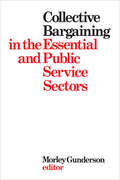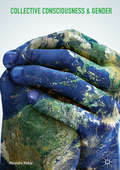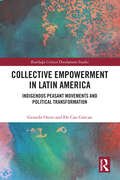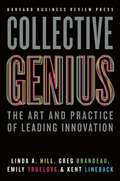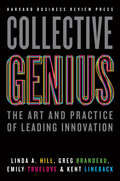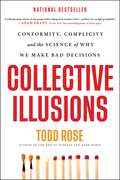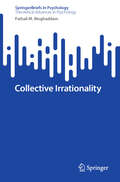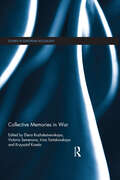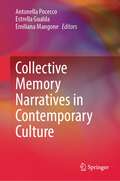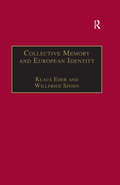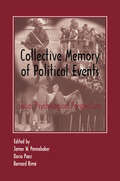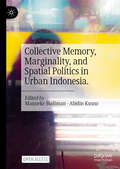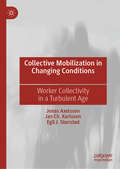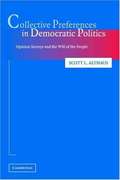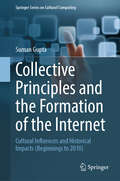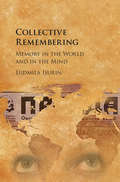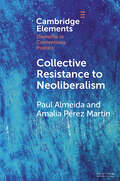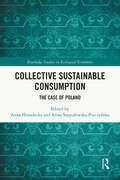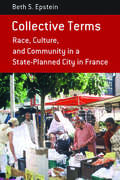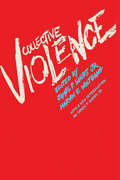- Table View
- List View
Collective Animal Behavior
by David J. SumpterHow and why animals produce group behaviorsFish travel in schools, birds migrate in flocks, honeybees swarm, and ants build trails. How and why do these collective behaviors occur? Exploring how coordinated group patterns emerge from individual interactions, Collective Animal Behavior reveals why animals produce group behaviors and examines their evolution across a range of species.Providing a synthesis of mathematical modeling, theoretical biology, and experimental work, David Sumpter investigates how animals move and arrive together, how they transfer information, how they make decisions and synchronize their activities, and how they build collective structures. Sumpter constructs a unified appreciation of how different group-living species coordinate their behaviors and why natural selection has produced these groups. For the first time, the book combines traditional approaches to behavioral ecology with ideas about self-organization and complex systems from physics and mathematics. Sumpter offers a guide for working with key models in this area along with case studies of their application, and he shows how ideas about animal behavior can be applied to understanding human social behavior.Containing a wealth of accessible examples as well as qualitative and quantitative features, Collective Animal Behavior will interest behavioral ecologists and all scientists studying complex systems.
Collective Bargaining in the Essential and Public Service Sectors: Proceedings of a conference held on 3 and 4 April 1975, organized by David Beatty through the Centre for Industrial Relations University of Toronto, chaired by John Crispo
by Morley GundersonIn Toronto, in April 1975, three Canadians and one American each presented a paper at a conference on what has become the key issue in current industrial relations – collective bargaining in the essential and public service sectors. This book presents those papers along with transcripts of the substantial and lively discussions that followed each one and involved many of the leading Canadian figures in this field. The status of government employees is one of the most prominent of the issues discussed. The speakers, Ben Aaron, University of California, Jean Boivin, Université Laval, James Matkin, Government of British Columbia, and Paul Phillips, University of Manitoba, deal with the causes of unrest in the essential and service sectors of the economy, the interrelationship of market and political forces, the results of various forms of government intervention, and also with international comparison of procedures for dispute settlement. There was a considerable diversity of opinion expressed, yet there emerged from the discussions a sense of agreement as to which policies should be followed and those that definitely should not. The debate on collective bargaining in the essential and public sectors is current in legislatures and elsewhere. This work will be helpful in advancing that debate and in encouraging the adoption of measures conducive to social harmony. It will interest students of industrial relations, all those involved in public and essential service negotiations and legislation, and members of the general public affected by the disputes and interested in their resolution. The conference was organized by David Beatty and chaired by John Crispoo, and the papers edited by Morley Gunderson, all of the University of Toronto.
Collective Consciousness and Gender
by Alexandra WalkerThis book explores collective consciousness and how it is applied to the pursuit of gender justice in international law. It discusses how the collective mode of behaviour and identity can lead to unconscious role-playing based on the social norms, expectations or archetypes of a group. Alexandra Walker contends that throughout history, men have been constructed as archetypal dominators and women as victims. In casting women in this way, we have downplayed their pre-existing, innate capacities for strength, leadership and power. In casting men as archetypal dominators, we have downplayed their capacities for nurturing, care and empathy. The author investigates the widespread implications of this unconscious role-playing, arguing that even in countries in which women have many of the same legal rights as men, gender justice and equality have been too simplistically framed as ‘feminism’ and ‘women’s rights’ and that giving women the rights of men has not created gender balance. This book highlights the masculine and feminine traits belonging to all individuals and calls on international law to reflect this gender continuum.
Collective Consciousness and the Phenomenology of Émile Durkheim (SpringerBriefs in Sociology)
by Carlos BelvedereThe book is addressed to scholars and students in sociology and in phenomenological philosophy. It presents the work of Durkheim in a new light and discusses the prevailing interpretations in the collective intentionality approach. It also provides a fresh conception of collective consciousness which illuminates features unattended by the traditions initiated by John Searle, Dan Zahavi and the Center for Subjectivity Research, and the Nordic Society of Phenomenology. This lucidly written book is of interest to students and scholars researching Durkheim's, Husserl’s and Schutz’s works.
Collective Decision Making in Rural Japan (Michigan Papers in Japanese Studies #11)
by Robert C. MarshallCollective Decision Making in Rural Japan
Collective Empowerment in Latin America: Indigenous Peasant Movements and Political Transformation (Routledge Critical Development Studies)
by Gerardo Otero Efe Can GürcanThis book develops a theory of collective empowerment that looks for change both from the bottom up, in civil society, and from the top down, from state interventions responding to such pressure.Reflecting on the advancement of Indigenous and peasant movements in Latin America since the neoliberal reformation of capitalism in the 1980s, the book outlines a path for progressive social action in which bottom-up pressure by social movements can help progressive parties to gain state power. The book considers how Indigenous and peasant movements in Argentina, Bolivia, Brazil, Ecuador, and Mexico have tried to reshape crucial structures of society from the bottom up. While this mobilization from below is critical and necessary, the book argues that these movements must be supplemented by top-down change from progressive state interventions, as happened mostly in Bolivia and Brazil. The authors conclude that progressive societal action can have massive impact in transforming some of the main socioeconomic structures that determine humans’ relation to the extraction of natural resources, income and wealth inequality, and even the location of a nation’s insertion in world capitalism.This book will be an important resource for social-movement activists and for researchers working in political sociology, sociological theory, political studies, development studies, social movements, and Latin American Studies.
Collective Forgiveness: The Constructive Power of an Enigmatic Feeling
by Oliver ErrichielloIn this age of a hyper-complex and totally interconnected world that no longer knows pauses, forgiveness is essential. The author explains that collective forgiveness is in no way inferior to love in its mysteriousness. We humans are unfathomable beings. Although we usually act thoughtfully and rationally, many actions and decisions cannot seem to be logically derived. Forgiveness - everyone knows it and has experienced it - is one of them. Forgiveness is one of the most important and exciting phenomena of human communication. The book answers questions such as: Why do we forgive some people and not others? Why does forgiveness take time? Why have people always forgiven each other - or rejected the very act of forgiving? Do we forgive individuals in a personal environment more easily or we more hesitant than with a group of people? And most importantly, why is collective forgiveness effective across time and cultures? The book is thought-provoking and offers valuable impulses to better understand one's own and social actions.This book is a translation of the original German 1st edition Kollektives Verzeihen by Oliver Errichiello, published by Springer-Verlag GmbH, DE, part of Springer Nature in 2021. The translation was done with the help of artificial intelligence (machine translation by the service DeepL.com). A subsequent human revision was done primarily in terms of content, so that the book will read stylistically differently from a conventional translation. Springer Nature works continuously to further the development of tools for the production of books and on the related technologies to support the authors.
Collective Genius: The Art and Practice of Leading Innovation
by Kent Lineback Linda A. Hill Greg Brandeau Emily TrueloveWhy can some organizations innovate time and again, while most cannot? You might think the key to innovation is attracting exceptional creative talent. Or making the right investments. Or breaking down organizational silos. All of these things may help#151;but there’s only one way to ensure sustained innovation: you need to lead it#151;and with a special kind of leadership. Collective Genius shows you how. Preeminent leadership scholar Linda Hill, along with former Pixar tech wizard Greg Brandeau, MIT researcher Emily Truelove, and Being the Boss coauthor Kent Lineback, found among leaders a widely shared, and mistaken, assumption: that a #147;good” leader in all other respects would also be an effective leader of innovation. The truth is, leading innovation takes a distinctive kind of leadership, one that unleashes and harnesses the #147;collective genius” of the people in the organization. Using vivid stories of individual leaders at companies like Volkswagen, Google, eBay, and Pfizer, as well as nonprofits and international government agencies, the authors show how successful leaders of innovation don’t create a vision and try to make innovation happen themselves. Rather, they create and sustain a culture where innovation is allowed to happen again and again#151;an environment where people are both willing and able to do the hard work that innovative problem solving requires. Collective Genius will not only inspire you; it will give you the concrete, practical guidance you need to build innovation into the fabric of your business.
Collective Illusions: Conformity, Complicity, and the Science of Why We Make Bad Decisions
by Todd RoseDrawing on cutting-edge neuroscience and social psychology research, an acclaimed author demonstrates how so much of our thinking is informed by false assumptions—making us dangerously mistrustful as a society and needlessly unhappy as individuals. The desire to fit in is one of the most powerful, least understood forces in society. Todd Rose believes that as human beings, we continually act against our own best interests because our brains misunderstand what others believe. A complicated set of illusions driven by conformity bias distorts how we see the world around us. From toilet paper shortages to kidneys that get thrown away rather than used for transplants; from racial segregation to the perceived &“electability&” of women in politics; from bottled water to &“cancel culture,&” we routinely copy others, lie about what we believe, cling to tribes, and silence people. The question is, Why do we keep believing the lies and hurting ourselves? Todd Rose proves that the answer is hard-wired in our DNA: our brains are more socially dependent than we realize or dare to accept. Most of us would rather be fully in sync with the social norms of our respective groups than be true to who we are. Using originally researched data, Collective Illusions shows us where we get things wrong and, just as important, how we can be authentic in forming opinions while valuing truth. Rose offers a counterintuitive yet empowering explanation for how we can bridge our inference gap, make decisions with a newfound clarity, and achieve fulfillment. **National Bestseller** **Wall Street Journal Bestseller** **Named Amazon's 2022 Best Book of the Year in Business, Leadership, and Science**
Collective Irrationality (SpringerBriefs in Psychology)
by Fathali M. MoghaddamThe goal of this book is to provide, first, a critical discussion of collective irrationality from the perspectives of different research traditions in psychological science and, second, introduce a forward- looking theory of collective irrationality, one that will help stimulate greater attention to this topic on the part of researching and practicing psychologists. Collective irrationality is a neglected topic in mainstream psychology. Individual irrationality has been extensively examined from different research perspectives, most recently through the lens of cognitive neuroscience, but collective irrationality continues to be ignored. This is in large part due to the reductionism of mainstream psychology, dominated as it is by the individualistic culture of the United States. However, the most serious challenges confronting humankind, including global warming and nuclear proliferation, arise out of collective irrationality, which is in a number of important ways different from individual irrationality. Thus, the neglect of collective irrationality represents an important gap that this work will help fill.
Collective Memories in War (Studies in European Sociology)
by Elena Rozhdestvenskaya Victoria Semenova Irina Tartakovskaya Krzysztof KoselaThis edited collection offers an empirical exploration of social memory in the context of politics, war, identity and culture. With a substantive focus on Eastern Europe, it employs the methodologies of visual studies, content and discourse analysis, in-depth interviews and surveys to substantiate how memory narratives are composed and rewritten in changing ideological and political contexts. The book examines various historical events, including the Russian-Afghan war of 1979-89 and World War II, and considers public and local rituals, monuments and museums, textbook accounts, gender and the body. As such it provides a rich picture of post-socialist memory construction and function based in interdisciplinary memory studies.
Collective Memory Narratives in Contemporary Culture
by Emiliana Mangone Antonella Pocecco Estrella GualdaStarting from the central importance of memory in contemporary societies, this book encourages a transdisciplinary reflection on how the “presentification of the past” is never a simple reenactment but corresponds to the interaction between memory and cultural sensitiveness, present beliefs and needs, expectations, and forecasts for the future. It studies cultural (re)construction through collective stories, including academic debates, media narratives, collective mobilizations, state narratives of history, architectural reconstructions, and artistic expressions. It looks at how technological innovations have profoundly changed the practices of conservation and dissemination of collective memory, with particular reference to cultural digitization. Finally, it shows that the relevance and selection of events, the organization of connections and cross-references between past, present, and future, as well as the importance of diversified collective imaginaries are the keys to narrative constructions of memory that prove to be sensitive and decisive for its continuity and its intergenerational transmission. This interdisciplinary collection is for students and scholars of the social sciences, cultural studies, and the humanities interested in memory studies.
Collective Memory and European Identity: The Effects of Integration and Enlargement
by Willfried SpohnIs it possible to create a collective European identity? In this volume, leading scholars assess the link between collective identity construction in Europe and the multiple memory discourses that intervene in this construction process. The authors believe that the exposure of national collective memories to an enlarging communicative space within Europe affects the ways in which national memories are framed. Through this perspective, several case studies of East and West European memory discourses are presented. The first part of the volume elaborates how collective memory can be identified in the new Europe. The second part presents case studies on national memories and related collective identities in respect of European integration and its extension to the East. This timely work is the first to investigate collective identity construction on a pan-European scale and will be of interest to academics and postgraduate students of political sociology and European studies.
Collective Memory of Political Events: Social Psychological Perspectives
by James W. Pennebaker Bernard Rimé Dario PaezResearch in collective memory is a relatively new area capturing the interest of scholars in social psychology, memory, sociology, and anthropology. The core idea is that collective attitudes and behaviors are created and shared through common experiences and communication among a cohort of people. For example, people born between 1940 and 1960 are often defined via the JFK assassination and the Vietnam War. Their parents typically experienced lesser impact from these events. Papers about collective memory have appeared in the literature under different guises for the last hundred years. Freud's Civilization and Its Discontents, Jung's ideas on the collective unconscious, and McDougall's speculation on the group mind posited that identity and action could be viewed as resulting from the shared development of a culture. Halbwachs, a French social psychologist (1877-1945) who was the first to write in detail about the nature of collective memory, argued that basic memory processes were all social. That is, people remember only those events that they have repeated and elaborated in their discussions with others. In the last several years, there has been a resurgence of interest in this general topic because it addresses some fundamental questions about memory and social processes. Work closely related to these questions deals with the nature of autobiographical memory, traumatic experience and reconstructive memory, and social sharing of memories. This book brings together an international group of researchers who have been empirically studying some basic tenets of collective memory.
Collective Memory, Marginality, and Spatial Politics in Urban Indonesia.
by Abidin Kusno Manneke BudimanThis volume presents three important themes for the study of Indonesian politics, cultures, and urban space: 1) urban regeneration and collective memory, 2) marginality and the other archives, 3) mood, medium, and media. Readers will find in the collection elements of urban imaginary and practices as represented in essays on community archiving, heritage, spatial experiments, gangsters and hooligans, sex work and sexual violence, youth subcultures, marketplaces, museums, and elite subdivisions. With this, the book offers readers a way to look at how the contributors approach the ever- shifting urban space as a cultural and political arena: how space is represented, produced and contested and how they are implicated in identity formations today and in the past; how individual and collective memories are fixated, disrupted, or catapulted forward by mobility and spatial transformation; how people, landscapes, buildings, movements join forces in transforming self and space, resulting in significant reconfiguration of politics, culture, and memory. This is an open access book.
Collective Mobilization in Changing Conditions: Worker Collectivity in a Turbulent Age
by Jan Ch. Karlsson Jonas Axelsson Egil J. SkorstadThis book presents the first published account in English of Sverre Lysgaard's theory of the ‘worker collectivity’ – a theory of an informal protective organisation among subordinate employees, which so far has been unknown outside Scandinavia. Lysgaard’s theory espouses that workers collectively form a buffer against management to protect themselves from the technical/economic power, which controls their working lives. The authors have returned to the same Norwegian factory Lysgaard studied in the 1950s to carry out ethnographic fieldwork in the 1980s and 2010s, and investigate the changing nature of the production, labour processes and management strategies. Through analysis that extends over 50 years of factory life, this research documents shifting power relations between workers and employers during times of changing institutional structures, globalisation, and worker solidarity. A revised version of the theory is also presented as an answer to some of the uncovered deficiencies in the original framework. The book will be of interest to students and scholars of the sociology of work, labour studies, business management and organisation studies.
Collective Preferences In Democratic Politics: Opinion Surveys And The Will Of The People
by Scott AlthausSince so few people appear knowledgeable about public affairs, one might question whether collective policy preferences revealed in opinion surveys accurately convey the distribution of voices and interests in a society. This study, the first comprehensive treatment of the relationship between knowledge, representation, and political equality in opinion surveys, suggests some surprising answers. Knowledge does matter, and the way it is distributed in society can cause collective preferences to reflect disproportionately the opinions of some groups more than others. <p><p> Sometimes collective preferences seem to represent something like the will of the people, but frequently they do not. Sometimes they rigidly enforce political equality in the expression of political viewpoints, but often they do not. The primary culprit is not any inherent shortcoming in the methods of survey research. Rather, it is the limited degree of knowledge held by ordinary citizens about public affairs. Accounting for these factors can help better appreciate thepossibilities for using opinion polls to represent the people's voice.
Collective Principles and the Formation of the Internet: Cultural Influences and Historical Impacts (Beginnings to 2010) (Springer Series on Cultural Computing)
by Suman GuptaThis book describes how distinctive socio-political commitments and cultural practices developed upon the internet in the later 20th and early 21st century and considers what lies ahead in those terms. Five decades after the internet&’s technological structure began to be erected, and three decades after engagement with it started burgeoning, an active and global collective formation has grown upon it. This collective formation is dubbed the &‘Internet Polity&’ here and is distinguishable from, and yet embedded within, real-world collectives. Despite divergences and conflicts, its organization is based on certain shared principles and its culture characterized by distinctive discursive practices. This book examines how the Internet Polity developed until 2010, in terms of the technological and cultural features that have supported it. Accordingly, the Internet Polity&’s emerging prospects are considered. Topics and features: Gives an original framework for understanding the global collective grounded on the internet as a social space Presents a history of the technological basis and communication features of this collective, from the beginnings to 2010 Offers an interdisciplinary perspective that cuts across most disciplines of the humanities and social sciences Describes the histories of and debates surrounding popular terms like &‘cyberspace,&’ &‘information superhighway,&’ &‘Internet of Things,&’ &‘hacker,&’ etc. This wide-ranging and original book is for researchers, graduate students, professionals and informed readers who are interested in information technology and political culture, digital humanities, sociolinguistics and communication studies, history of the internet, contemporary social organization and political philosophy.
Collective Remembering: Memory in the World and in the Mind
by Ludmila IsurinThis interdisciplinary study explores collective memory as it is presented by official producers (such as textbooks and media) and reflected by consumers (group members). Focusing on a case study of Russians and Russian immigrants to the USA and their memories of seminal events in the twentieth-century Russian collective past, Isurin shows how autobiographical memory contributes to the formation of collective memory, and also examines how the memory of the shared past is reconstructed by those who stayed with the group and those who left. By bringing together historical, anthropological, and psychological approaches, Collective Remembering provides a new theoretical framework for memory studies that incorporates both content analysis of texts and empirical data from human participants, thus demonstrating that methodologies from the humanities and the social sciences can complement each other to create a better understanding of how memory works in the world and in the mind.
Collective Resistance to Neoliberalism (Elements in Contentious Politics)
by Paul Almeida Amalia Pérez MartínCivil society actors contested the fifty-year long transition to a global economy based on the principles of neoliberalism. Mobilization against neoliberal measures represents one of the most common forms of social-movement activity across the world. We explore the evolution of resistance to economic liberalization from the 1970s to the current period. Our study highlights several dimensions of civic opposition to the implementation of free market policies, including: forms of neoliberalism; geographic distribution of protest events across world regions and time; and outcomes of movement campaigns.
Collective Sustainable Consumption: The Case of Poland (ISSN)
by Anna Horodecka Alina Szypulewska-PorczyńskaIn the face of climate change and resulting environmental and social crises, sustainable consumption has become a widely discussed issue and a key plank of the UN’s Sustainable Development Goals (SDGs). The majority of the sustainable consumption research uses the SDG framework, but this only serves to reinforce an individualistic, efficiency-based approach and it does not sufficiently cover the specific situation of transition economies. In contrast, this volume promotes a collective approach to sustainable consumption, and combines general theoretical issues with empirical examples from the Polish economy. The first part of the book presents a theoretical approach to collective consumption which has the core concepts of justice and human nature at its heart. This approach emphasises the role of collective rationality and categorises aspects of sustainable consumption as a common and public good. The second part investigates diversified aspects of sustainability, including socio-economic inequalities as barriers to sustainable consumption, consumer sovereignty in the context of current legal regulations, and the impact on employees of changes to the types and conditions of work. It also examines the sharing economy and the legal conditions of its development. The third part adopts a political perspective focusing on the state policies enhancing the role of investment in public goods, analyses photovoltaic programmes which promote prosumption and indicates challenges to sustainability faced by many countries such as the energy crisis, sustainable finance, and cooperative platforms.This book will be of great interest to researchers and scholars interested in sustainability and consumption issues in economics, management, law, public administration, and political science.
Collective Terms
by Beth S. EpsteinThe banlieue, the mostly poor and working-class suburbs located on the outskirts of major cities in France, gained international media attention in late 2005 when riots broke out in some 250 such towns across the country. Pitting first- and second-generation immigrant teenagers against the police, the riots were an expression of the multiplicity of troubles that have plagued these districts for decades. This study provides an ethnographic account of life in a Parisian banlieue and examines how the residents of this multiethnic city come together to build, define, and put into practice their collective life. The book focuses on the French ideal of integration and its consequences within the multicultural context of contemporary France. Based on research conducted in a state-planned ville nouvelle, or New Town, the book also provides a view on how the French state has used urban planning to shore up national priorities for social integration. Collective Terms proposes an alternative reading of French multiculturalism, suggesting fresh ways for thinking through the complex mix of race, class, nation, and culture that increasingly defines the modern urban experience.
Collective Violence
by James F., Short Marvin E. WolfgangCollective violence has played an important role throughout American history, though we have typically denied it. But it is not enough to repress violence or to suppress our knowledge of it. We must understand the phenomenon, and to do this, we must learn what violent groups are trying to say. Th at some choose violence tells us something about the perpetrators, inevitably, about ourselves and the society we have built.
Collective Violence and the Agrarian Origins of South African Apartheid, 1900-1948
by John HigginsonThis book examines the dark odyssey of official and private collective violence against the rural African population and Africans in general during the two generations before apartheid became the primary justification for the existence of the South African state. John Higginson discusses how Africans fought back against the entire spectrum of violence ranged against them, demonstrating just how contingent apartheid was on the struggle to hijack the future of the African majority.

